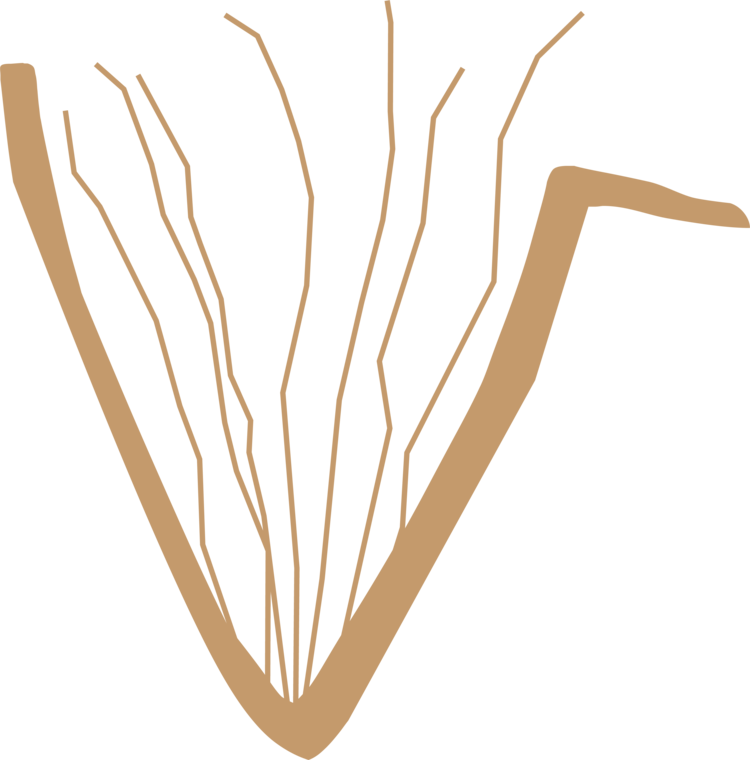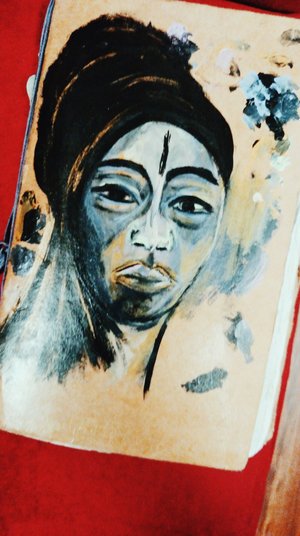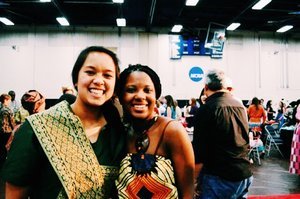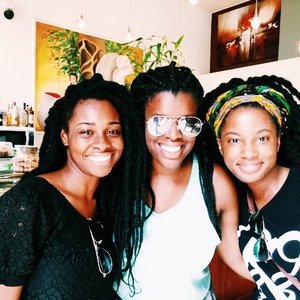journals + journeys: christina thomas
christina is a north carolina native and a recent graduate from messiah college. currently she is completing her masters in history with a focus in african american history with the hopes of gaining admission into a phd program this fall (she will gain admission into a phd program). she enjoys reading, writing,
and researching the stories of ordinary black men and women who dedicated their lives in changing the world not only for
themselves, but for their people. this is her same mission. she also loves to help people find their own family’s history.
you can follow her research and life adventures
on her blog, diary of a historian or on instagram.
Why is journaling necessary for you?
I want to remember. I want to see how I grew over the years and what made me become who I am today.
It is no secret that I am an introvert. As an introvert, journaling allows me to be loud. Sometimes, I do not speak my mind or want to be around people, so instead I pick up my pen, grab my journal, and create my space--the place I go to write whether it is on a bench outside or in a coffeeshop and write for a few minutes or an hour.
Also as a Black woman living in today’s world, for me journaling is a way to give voice to all these built up emotions. Videos are played on repeat of the police shooting an unarmed black men or women.
Each week, new hashtags of men and women fill the internet and nothing happens to those who pulled the trigger.
I need that space to write before I have to go to work and act like none of this affects me.
I need that space to cry.
I need that space to release.
Lastly, I also want my children or whoever I allow to read my journal to know what I felt and to remember that you have a right to feel this way--no one can dictate your reaction to the world.
“ You are a historian. We are historians, just don’t add it on your resume yet.”
When did you start journaling as a practice?
I loved to read as a child and was a little too inspired from book characters. Either in the 4th or 5th grade I read Harriet, I Spy. It was a book about a young white girl who wrote about the world around her. The kid was sneaking into people’s houses and everything. I wanted to be little Harriet, so I took my notebooks and begin to write everything I saw, felt, or heard. I got in a lot of trouble too. I mean it was bad, I was on the other line of phone calls and hiding under my mom’s bed. And from there, I kept writing and reading.
Now as a practice, it was not until my junior year of college (2013) where I journaled as a way to remember, write quotes, set goals, and to cope with life. The college I went to was challenging (being Black at a PWI, Chimene you know!) and I was angry every single day about something. I spoke about it a lot to my friends, but we were all tired of it. Journaling gave me a space to write and process. And it stuck on and is now a part of my self-care process.
What date did you start your recent Vagabroad Journal?
My first entry was January 1, 2016. It was my New Year’s Resolution to give myself time and space to journal daily, not weekly, not monthly, but DAILY.
If you’d like, would you mind sharing a season in your life when journaling was extremely difficult?
During my second semester of this graduate program, I felt like a failure. All I wanted to do was quit. I doubted myself, my ability to do well in school, write a thesis proposal, and successfully defend it. Since high school, I placed a tremendous amount of pressure on myself to succeed academically. Why? Because education was my only way to provide for myself and how I measured my success. My assignments were bad, my professors were e-mailing me non-stop, and I received critique after critique. It was hard to write, it was hard to do anything. In fact my only journal entry was February 10th and it began with the words “I am done”. Luckily, I had the support of other Black women at the university through a weekly Empowered Black Women’s therapy discussion group. I had to be honest with myself and TAKE A BREAK. It is okay to do that from time to time. I am still confronting those fears, but I write more about them which helps those thoughts not dwell constantly in my mind.
““some of the greatest books
i have read in my life where from
the journals of courageous
and strong black women who i admire.
they probably never thought
that the words they penned
on some random day years ago
would encourage
a young woman like me.”
According to your IG bio, you’re a “Future historian and genealogist”. Could you unpack the correlation between journaling and one’s history, genealogy at the soul level?
Ooo, that is deep. I think about it like this: The first thing we learn to write in school is our names. Next we learn words. Then sentence formation. And finally stories. I remember doing those little half sheets of stories with the top half reserved for a drawing about the story. The story involved what we liked, what we did that weekend, or what we wanted to be when we grew up. You see, we are first taught to write about ourselves and later about the world around us. That is what I, as a historian in the making, look for when researching my biographers.
As a huge advocate of self-care, I realized I must first learn about myself, learn what I like, how I react, and my own history--what has affected me in life? What has encouraged me along the way? Where do I want to go? Without being aware of my history (where I came from and where I want to go) it is hard to continue forward because I lack a personal foundation.
Let me make it simple:
(1) Know who you are.
(2) Write about who you are and then you can
(3) Write about the world around you.
And as you write and ARCHIVE yourself, you can go back and look at your history full of growth, joy, love, heartbreak, healing, and life. And sometimes I look back at what I wrote, my history, and become disappointed with where I am at, yet I am able to see that because I kept note of me.
Do you ever think of your journal as your history? Why should a diarist think of herself as a historian? Talk about that.
YES! Historians use something called “primary sources” as historical evidence. They are considered to be the “raw materials of history”, first hand accounts of what has happened. Our journals are first hand accounts of our histories!
I can look back on January 1, 2016 and note that I made a goal to start a journal along with other goals for the new year. I can look at March 2nd to where I said “Life has been a mess, a good learning mess”, and mark my growth. May 16th at 6:43pm, I wrote about a date with a man who the next day I wrote was a no good…(we have all been there before). When we write, we archive [our lives]. We document the past, store it in our precious journals, and preserve our histories, our journeys.
You are a historian. We are historians, just don’t add it on your resume yet.
What value do you think your journals will have for the woman you will be in 10 years?
Wow, in ten years I will be 34 years old!
My journals will be those pieces of my life that will remain in carry-on bags at the airport and not the checked ones. I don’t want to lose them. They will be my personal time capsules that I read every so often to laugh, cry, and learn from myself. They are my story, my chapters in life that I hope to share a piece of with my circle of friends. Some of the greatest books I have read in my life where from the journals of courageous and strong Black women who I admire. They probably never thought that the words they penned on some random day years ago would encourage a young woman like me.
What time of the day is your ideal writing time?
My ideal time of the day to write is at night before going to bed. It helps me clear up my thoughts and reflect on the day. I write and drink some peppermint tea, pray, do a bit of devotion, and fall right to sleep.
What are some songs on your journaling playlist?
My playlist features Cynthia Enrivo’s (amazing singer!!) Fly Before You Fall, Anything Worth Holding on To; everything by Ashley Du Bose, and Macy Gray’s new studio album. Soulful singers with beautiful, inspirational lyrics.
Have you ever finished a journal? Can you describe the feeling?
Out of all the journals I owned, I never finished a single one, but I am almost done with this Vagabroad Journal!
Christina, far right, with her sisters.
As I inch toward the last pages, I feel more and more accomplished and ready to write the next book. I need to order a new one soon so I can smoothly transition into my next journal.
Would you share a journaling prompt(s)?
What is your vision?
Who do you want to be?
Write down a list of your goals for the next month? The end of the year? New year?
Write down what you hope to accomplish and action steps towards achieving your goal. Keep this on a separate page in your journal or even the front/back page to mark when you met your goals or worked toward them.
What would you say to a fellow teastained woman who does not see value in keeping a journal?
Sister, remember how to write. Write your name, write some words, write some sentences, and tell your story. You don’t do it for anyone else, but YOU. You have the power in your pen and your words matter. Your voice matters. You matter so write your history, archive your journey, and remember who you were.
Last question. I’ll ask because people see me with my journal in public and ask my all the time: would you ever write a book?
Yes, but it will be someone else’s story which I am excited to share :) Maybe I will write a few personal short stories. Who knows? But yes, you will see my work soon!








